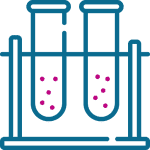Homocysteine – a test used to assess nutritional status when deficiencies of folic acid, vitamin B6 and/or vitamin B12 are suspected. It is used to diagnose the rare birth defect homocystinuria. It can also be used to assess the risk of heart attack or stroke, and to monitor treatment in people whose homocysteine levels have been found to be too high.
When should I be tested?
The test is recommended for suspected deficiencies of folic acid, vitamin B6 and/or vitamin B12, for malnourished people, such as the elderly (who often get less vitamin B12 from food), and for alcohol and/or substance abusers. Infants are tested for suspected homocystinuria as part of a composite investigation of inherited metabolic diseases in the neonatal period.
This testing is also recommended for people at high risk of heart attack and stroke, depending on the age of the person, and for people who have a family history of ischaemic heart disease (coronary artery disease) and have no known risk factors for this disease.
What sample is needed for the test?
Blood is drawn from a vein in the arm.
How to prepare for the survey?
Refrain from eating for at least 8 hours before the sample is taken. You can only drink water.
What do my results mean?
This levels may be elevated in the case of inadequate nutrition or deficiencies of vitamin B12 or folic acid. If the body does not get enough B vitamins and/or folic acid from food or supplements, it may not be able to convert homocysteine into forms it can easily use. In this case, blood levels of homocysteine may increase. In many cases, homocysteine levels can be reduced by taking folic acid, vitamin B12 and vitamin B6 – three B vitamins involved in homocysteine metabolism. In particular, older people may need to take these vitamins to keep their homocysteine levels low.
Significantly elevated levels in an infant or child’s blood (including urine) are likely to indicate homocystinuria, and the cause of this condition should be confirmed by additional diagnostic tests.
Older people with high levels have a much higher risk of heart attack and stroke than people with moderate levels of this amino acid. To date, a direct causal link between elevated homocysteine levels and heart attack or stroke has not been proven, but there is evidence that elevated homocysteine levels correlate with survival in myocardial infarction and stroke. Coronary artery blockage (a direct cause of myocardial infarction) is more than twice as likely in individuals with elevated homocysteine levels.
Homocysteine levels may increase with age, in smokers and in people taking drugs such as carbamazepine, phenytoin and methotrexate. Women have lower levels of homocysteine than men. In women, homocysteine levels increase after menopause due to a decrease in oestrogen synthesis.
Related studies
Folic acid, vitamin B12, urinary homocysteine, lipidogram
Related conditions/diseases.
Vitamin deficiency, homocystinuria, atherosclerosis, myocardial infarction, stroke
You can consult our family doctors.

